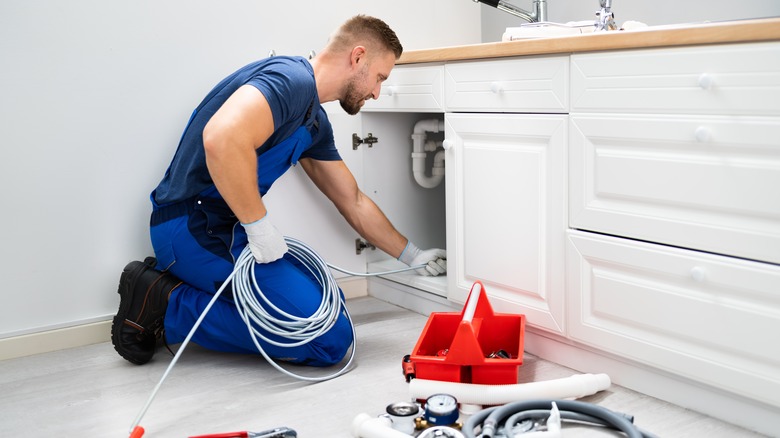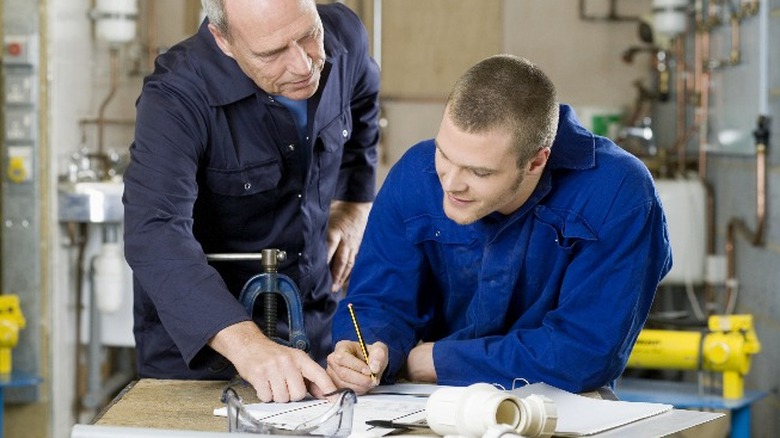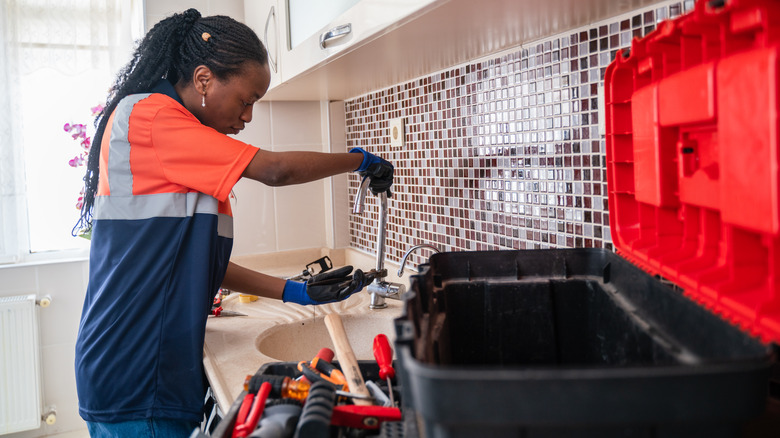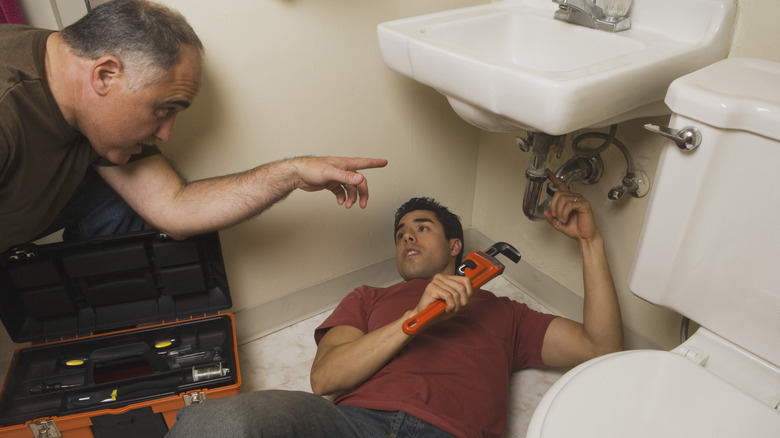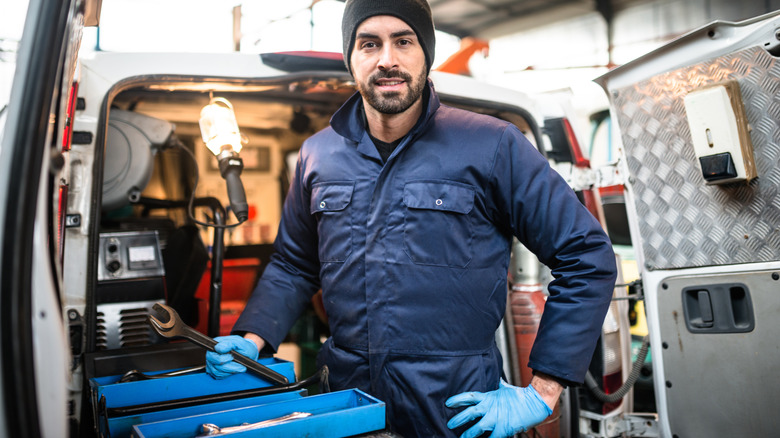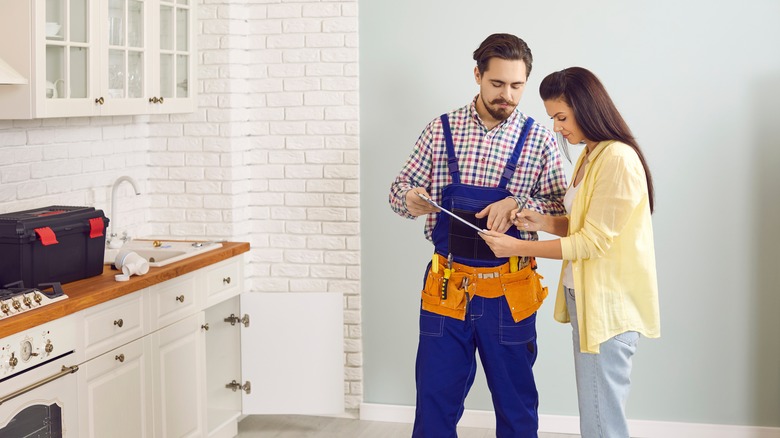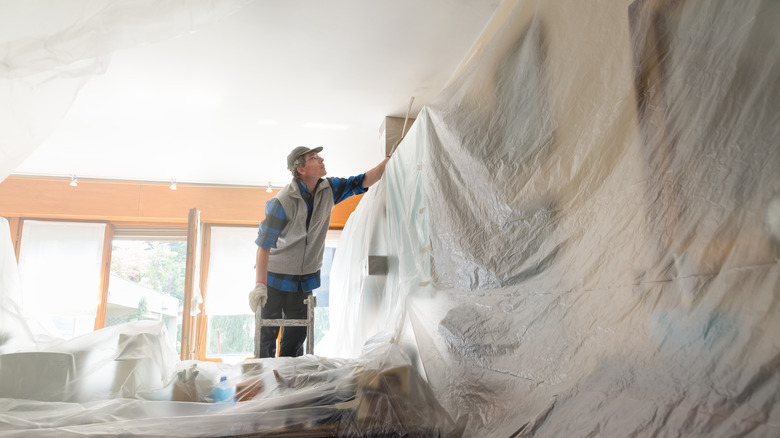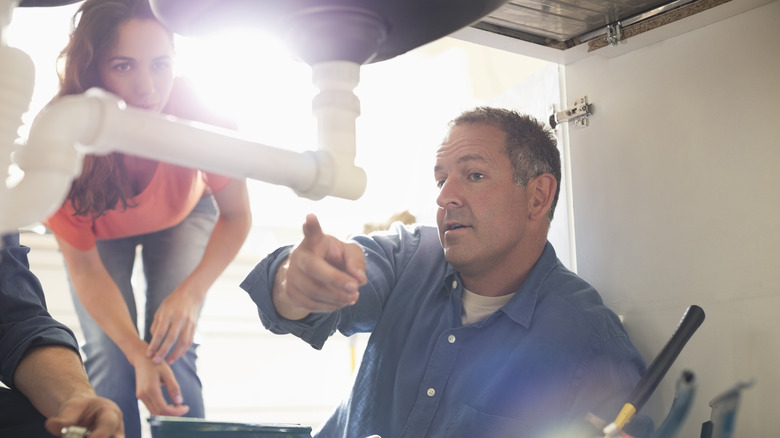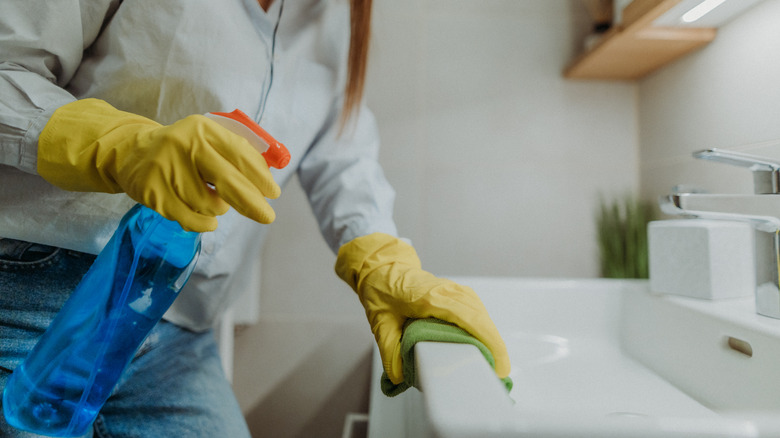Questions To Ask Before Hiring A Plumber
Basic plumbing knowledge may help you tackle smaller projects around the house, such as unclogging a drain or changing the flapper on a toilet. However, unless you have extensive plumbing knowledge, it is going to be best to call in a professional for larger-scale projects, such as upgrading a water heater or replacing a damaged pipe. But chances are there are several plumbing companies in your area, which can make it difficult to decide who you want to work with.
Coming up with a list of questions to ask each company or individual will help you narrow down the options and land on the right plumber or company to work with. The answers to these questions can provide valuable information about how they conduct business, the level of service you can expect to receive, and the overall quality of work that will be completed. Here's what to ask when gathering quotes.
Are you licensed, bonded, and insured?
The first question you should ask any individual or plumbing company you're thinking about working with is whether they are licensed, bonded, and insured. Finding a plumber that holds all three of these qualifications will help protect you and the work that will be done at your home. Licensed individuals have proven themselves worthy of the profession by completing thousands of hours of training, passing licensing exams, and more. If the work completed by a licensed plumber is not up to code, you can contact the licensing agency. There is no similar recourse if you choose to work with an unlicensed plumber.
Beyond looking for a licensed plumber, you should also make sure that they are bonded. In the event the company or individual you hire does not complete the project, does a subpar job, or damages your property, the surety bond they hold will cover the expenses for you. Finally, verify that they hold commercial liability insurance to prevent you from being liable for any injuries or damages that are incurred.
How much experience do you have?
Inquiring about the experience of each candidate is also advisable. Finding a plumber who has been in business for several years can provide you with greater peace of mind that they'll be able to handle the job's demands and work around any obstacles that pop up. If the plumber you choose to work with is licensed, then they will have completed the required work hours to receive their license.
In addition to asking about the number of years they have been in the plumbing business, ask more specific questions about their experience completing the type of job you'd be hiring them for. If you're looking to have something more specialized or involved completed, some candidates may have completed more similar tasks than others, making them the better fit for the job. Some plumbers who specialize in particular areas may also be able to offer lower pricing because of their ability to purchase discounted materials from suppliers.
Will you or someone else be performing the services?
The plumber you talk to on the phone or that comes out to your house may or may not be the one to actually perform the work on your home. Depending on the project's scope and the company's business model, they may hire subcontractors to complete some or all of the work. There is nothing inherently wrong with a larger company subcontracting their work, but you will want to get this question answered before the work actually starts.
If the company says that they will be hiring subcontractors for your job, ask a few follow-up questions about the individuals who will be completing the work. For example, you should find out whether the subcontractors are covered by the insurance policy, their level of experience, and how many times the company has worked with them in the past. If you get the feeling that your questions aren't being answered fully or to your satisfaction, then that could be a red flag and a sign that you should continue your search.
What warranty do you offer to back your work?
Asking whether a warranty is included to back up the work performed at your house is a question you won't want to skip. Plumbing warranties protect you against faulty parts or inadequate workmanship. In most cases, you should avoid hiring a contract that does not offer any type of warranty for the work they provide.
While plumbing warranties can vary based on the company and the type of work that is completed, try to find one that offers at least a one-year warranty for most jobs. One note, however, is that drain cleaning is rarely backed with more than a six-month warranty. Keep in mind that warranties will not cover any problems that are the result of improper use by the customer, so take care to read product manuals and ask questions to make sure you don't accidentally void them.
What hours do you work?
There are a few reasons to ask contractors about their working hours. First, you'll want to know when someone will likely be working in your home. If you end up being the first call of the day, you'll want to see if they'll arrive as early as 7 a.m. or later in the morning. Similarly, knowing when they're likely to stop working for the day will help you plan your schedule.
Another reason to ask a plumber about their work hours is to determine whether they offer 24/7 services. Even if the current job you're looking to get done isn't an emergency, it doesn't mean that you won't be dealing with a leaking water heater or clogged drain in the future that will require immediate attention. If a company you like does not offer 24/7 services, you could still hire them for the current job, but will want to find a different number for emergencies.
How much will you charge, and can I have the estimate in writing?
Of course, you'll want to ask how much the plumber will charge for the job you want completed. Some companies charge by the hour (or even half-hour), while others will charge a flat fee. If you choose a company that charges an hourly rate, be sure to ask for an estimate of how long they think they'll need to complete the task. When hiring an hourly contractor, you risk spending more than you're anticipating if the job takes longer than predicted.
In addition to finding out the way the company charges for their time, you will also want to see what they're charging for the parts they'll be using. Doing so will help you get a better feel for what your entire bill is likely to be. Finally, while an oral estimate can give you a general idea of what you'll be paying, it is advisable to also ask them to provide a written estimate. That way, you have something to refer back to or share if the final bill you're presented with is way off from the initial quote. Be wary of companies that don't seem willing to give you an estimate in writing; if they're not upfront with you from the beginning, giving them your business may not be a good idea.
How likely is it that the price is going to change once you start working?
After you've received a quote from each company — hopefully in writing — you should also ask how firm that quote is. With plumbing work, particularly work that is charged by the hour, the price is unlikely to be completely fixed. Little things may come up, and the contractor may take a bit longer to finish the job than anticipated.
This being said, you want to determine the likelihood that they'll discover any major obstacles or other problems that need to be repaired once they start. Having this information can help make sure you're prepared for the possibility that the final bill will end up a lot higher than the initial quote. Having a breakdown of the possible fees that you'll be charged in writing and engaging in a conversation about worst-case scenarios can help make sure you're not thrown off by a huge curveball.
Will you pull any permits that are needed?
Permits are required for many types of plumbing projects. The specific jobs that will need to be permitted will vary by state, city, or county, but the plumber you're working with should be familiar with when a permit is or is not necessary. Applying for a permit is an important step that you don't want to skip. While the permit will cost money, it can end up more costly if you don't get one. You could face penalties or have the work torn out and redone (with the permit this time). If you ever go to sell your house, potential buyers will have more confidence in the quality of the craftsmanship if they do some research and see that the proper permits were pulled.
Finding out whether permits are necessary is the first step. If the contractor tells you that one is indeed needed, you'll want to confirm whether they will be requesting the permit or whether it is something you will need to complete. If the plumber you're talking to says that they aren't necessary, but you feel like you might need one for your specific project, you can always call your permitting office to confirm. Avoid working with anyone who wants to do work without a permit when one is actually necessary; it's a huge red flag.
What steps will you take to avoid causing damage to my property?
Another question you should ask before making a final hiring decision is how (or even if) the plumber will protect your home. As the work is being completed, they will likely deal with heavy tools and parts. What will they do to make sure that your walls or floors won't be damaged by one of these pieces of equipment scraping against them or being dropped? Will they cover your floors and any nearby furniture or boxes with drop cloths? Is this something you'll be expected to do?
Depending on where the work needs to be done, the plumber may have to walk through several rooms in your home to get there. This also means that they'll need to walk back through these rooms, potentially with wet or dirty equipment and parts. Asking them what they will do to make sure that no water or gunk drips onto your floors can give you an idea about the respect they'll show for your home. You may also want to ask if they'll use shoe covers in the house to avoid tracking in dirt.
Do you have references to share?
Asking for references is a crucial step when looking for a new contractor. You can get some information from reviews on websites such as Google, but nothing can compare to speaking with an actual person who has used the company's services before. If you're talking to a legitimate company, they should have no problem sharing a few references. If they hem and haw and try to convince you that speaking with a past customer is unnecessary, that is a huge red flag. It is likely that past customers were not pleased with the completed work, or the company doesn't really have the credentials they're saying they do.
If references are shared with you, take a few minutes of your time to follow up with them. Ask their overall satisfaction with the company in question, along with some other questions to learn more about what you can expect as a customer. This may include whether the work was completed on time, whether the estimate was close to the final bill, the quality of the communication about the project, and the overall level of customer service that was provided.
Will you also check my home for other potential issues?
While you may have a specific project in mind for the plumber you're looking to hire, it doesn't mean there aren't any other issues in your home that may need attention. Some of these lurking problems may not even be on your radar. For example, do you know whether all of your drains are working properly? Do you know if your water heater is on its last leg? Finding a company that will also perform a plumbing inspection can help you identify these potential issues before they become major issues.
Your drains, supply lines, fixtures, shut-off valves, water heater, sump pump, and more will be evaluated during a plumbing inspection. If any issues are discovered, the plumber will bring them to your attention, share how serious they are, and let you decide whether it is something you want to address right away. The inspection can give you some peace of mind that a serious issue isn't looming on the horizon.
Who is responsible for cleaning up after the job is finished?
Learning who will be responsible for any necessary cleanup before the job even starts is also important. At a minimum, you want to ensure that the plumber will remove any old parts or equipment from the area, but you might also want to look for a company that will return your house to its original condition (or at least as close as possible). Walking into a huge mess once the work is completed will be a very unpleasant surprise and leave you with much work to do.
Many companies will take care of cleaning up for you; others may offer it for an additional fee. Confirm whether they will bring in a vacuum to remove small clippings, screws, or other debris on the ground and if they'll wipe toilets and sinks down after they're done working. Finding someone who will be careful can help limit the amount of cleanup necessary after the work is completed.
